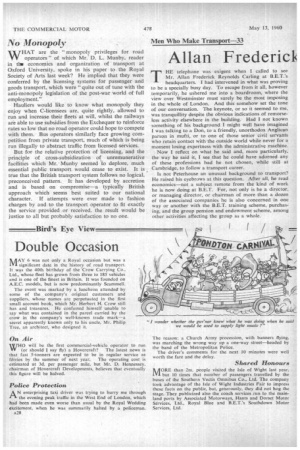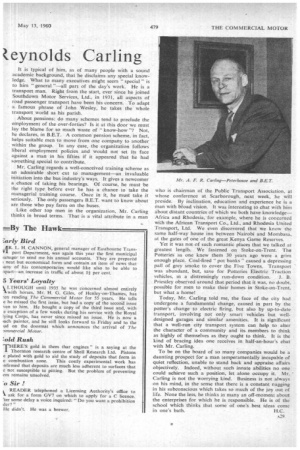Men Who Make Transport-33
Page 30

Page 31

If you've noticed an error in this article please click here to report it so we can fix it.
Allan Frederict Zeynolds Carling
THE telephone was exigent when I called to see Mr. Allan Frederick Reynolds Carling at B.E.T.'s headquarters. I had intervened in what was proving to be a specially busy day. To escape from it all, however temporarily, he ushered me into a boardroom, where the view over Westminster must surely be the most imposing in the whole of London. And this somehow set the tone of our conversation. The keynote, or so it seemed to me, was tranquillity despite the obvious indications of remorseless activity elsewhere in the building. Had I not known something of his background I might well have imagined I was talking to a Don, to a friendly, unorthodox Anglican parson in mufti, or to one of those senior civil servants who retain contact with the outside world while never for a moment losing expertness with the administrative machine.
Now I reflect on what he said and, more particularly, the way he said it, I see that he could have adorned any of these professions had he not chosen, while still at Cambridge, to follow a transport career.
Is not Peterhouse an unusual background to transport? He raised his eyebrows at this question. After all, he read economics—not a subject remote from the kind of work he is now doing at B.E.T. For, not only is he a director, or managing director; or chairman of more than a dozen of the associated companies he is also concerned in one way or another with the RE.T. training scheme, purchasing, and the group pension and endowment scheme, among other activities affecting the group as a whole. It is typical of him, as of many people with a sound academic background, that he disclaims any special knowledge. What to many executives might seem " special " is to him "general "—all part of the day's work. He is a transport man. Right from the start, ever since he joined Southdown Motor Services, Ltd., in 1931, all aspects of road passenger transport have been his concern. To adapt a famous phrase of John Wesley, he takes the whole transport world as his parish.
About pensions: do many schemes tend to preclude the employment of the over-forties? Is it at this door we must lay the blame for so much waste of know-how "? Not, he declares, in B.E.T. A common pension scheme, in fact, helps suitable men to move from one company to another within the group. In any case, the organization follows liberal employment policies and would not set its face against a man in his fifties if it appeared that he had something special to contribute.
Mr. Carling regards a well-conceived training scheme as an admirable short cut to management--an invaluable initiation into the bus industry's ways. It gives a newcomer a chance of taking his bearings. Of course, be must be the right type before ever he has a chance to take the managerial training course. Once in it, he must take it seriously. The only passengers B.E.T. want to know about are those who pay fares on the buses.
Like other top men in the organization, Mr. Carling thinks in broad terms. That is a vital attribute in a man who is chairman of the Public Transport Association, at whose conference at Scarborough, next week, he will preside. By inclination, education and experience he is a man with broad vision. It was interesting to chat with him about distant countries of which we both have knowledge— Africa and Rhodesia, for example, where he is concerned with the African Transport Co., Ltd., and Rhodesia United Transport, Ltd. We even discovered that we know the same half-way house inn between Nairobi and Mombasa, at the gates of one of the great Kenya Game Reserves.
Yet it was not of such romantic places that we talked at greatest length. We fastened on Stoke-on-Trent. The Potteries as one knew them 30 years ago were a grim enough place. Coal-fired "pot banks" caused a depressing pall of grey smoke to cover the Five Towns. Transport was abundant, but, save for Potteries Electric Traction vehicles, in a distressingly run-down condition. J. B. Priestley observed around that period that it was, no doubt, possible for men to make their homes in Stoke-on-Trent, but what a home!
Today, Mr. Carling told me, the face of the city had undergone a fundamental change, caused in part by the potter's change to electric firing, but also by up-to-date transport, involving not only smart vehicles but welldesigned garages and similat amenities. It is significant that a well-run city transport system can help to alter the character of a community and its members to think as highly of themselves as they ought to think. It is the kind of bracing idea one receives in half-an-hour's chat with Mr. Carling.
To be on the board of so many companies would be a daunting prospect for a man temperamentally incapable of quiet reflection, unable to stand back and appraise affairs objectively. Indeed, without such innate abilities no one could achieve such a position, let alone occupy it. Mr. Carling is not the worrying kind. Business is not always on his mind, in the sense that there is a constant nagging in his subconscious which takes so much of the joy out of life. None the less, he thinks in many an off-moment about the enterprises for which he is responsible. He is of the school which thinks that some of one's best ideas come
in one's bath. H.C.




































































































